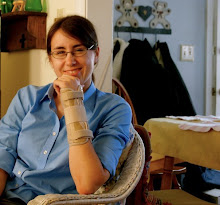When I first encountered Professor Frederick Holliday last fall in Reflections of American Society on Stage and Screen, his boundless energy grabbed my attention. Prof. Holliday loved talking and teaching about film...and he almost never managed to stay in one place for more than five minutes. More importantly, he treated his students with respect, as equal partners in the learning process.
When the semester finished and I left his class, I kept in sporadic touch with Professor Holliday. In February, I learned from one of my friends (who had signed up for Prof. Holliday's class at my urging) that my former professor had fallen sick. His pain increased, and he soon could not finish the semester. A few weeks later, I learned why. Doctors had diagnosed Professor Holliday with Stage 4 metastatic kidney cancer.
Over the next several months, I followed updates on Professor Holliday's condition, provided by his wife. Regina Holliday fulfilled the role of caretaker; while continuing to look after their two sons, she fought for her husband's care as they went in and out of five different hospitals, dealing with the confusion of botched records transfers, pain management, and treatments. By May, Prof. Holliday entered hospice care; by June they moved him home. There, on June 17, 2009, Professor Frederick A. Holliday died at age 39, surrounded by family and friends.
Professor Holliday taught me a great deal about how film and theater reflect the culture of their times. He also taught me what a truly energetic teacher looks like, and what it means to be really passionate about a subject. More than that, though, his experiences with the US health care system at the end of his life showed me the full extent of the need for real reform.
Others have also taken this lesson to heart. Since her husband's death, Regina Holliday has been employing her gifts for art and advocacy by painting murals in D.C., depicting the need for health care reform. In the latest one, "73 Cents," she has painted her husband in his hospital bed, surrounded by his children, a nurse with her hands tied, and other symbolic figures representing problems in the current health care system. The title of the mural comes from a fact she learned while Prof. Holliday was in the hospital: that a copy of his medical record cost seventy-three cents per page.
The mural has caught some significant public attention as the debate over health care has ramped up in recent weeks. Senate Majority Leader Harry Reid asked Mrs. Holliday to speak at a press conference for health care reform. The D.C. FOX affiliate channel, BBC America, and Dana Milbank's Washington Sketch column in The Washington Post also all featured the Hollidays' story over the summer.
Every time another news outlet tells the story, Mrs. Holliday notes this specifically: Before American University hired her husband, the two of them worked five jobs between them to support their family. None of these jobs offered health benefits, and even their combined income was not enough to afford family health insurance. As a result, Prof. Holliday had not been able to see a primary care doctor, so the symptoms of the cancer went unobserved by a medical professional. Had he been regularly receiving primary care, Mrs. Holliday maintains that doctors may have caught the cancer before it reached Stage 4.
The Hollidays' tragedy of health care deprived American University of an excellent professor, as well as a family of a loving husband and father. Their story is profound, and it comes at a time when health care has once again grabbed the national political consciousness. Few issues get more personal than health care-- most of us were patients when we were born, and will be patients when we die; many of us will also be patients at least once somewhere in the middle. A responsible government owes its citizens the chance to be healthy without going broke. No matter what the means of reform will be, I hope that any plan for "fixing the system" will include a comprehensive means of substantially reducing costs and radically expanding coverage.
In the meantime, the debate will go forward. Professor Holliday would have liked that, I think-- his classes always included lively discussion of a range of issues, and his wife is already actively participating in the current discourse. Civil discussion is the lifeblood of a good education as well as of a functioning democracy... that's just one more thing I learned from the Hollidays.
_____
More reading and viewing of the Hollidays' story:
Friday, August 14, 2009
Subscribe to:
Post Comments (Atom)

3 comments:
Thanks for a really, REALLY lovely piece.
Well said. Thank you for that. I knew Professor Holliday as a young man. I tutored him in math, and went to undergraduate school with him. It warms my heart to hear what a inspirational leader he became. I hope that your words reach the large audience they deserve. It is high time to fix what is broken, and move on from this mess created by corruption of power and greed some 36 years ago...
Thank you for this eloquent piece. I am Fred's sister-in-law. While I never had the privelege to know him as a teacher, I did know him as a husband to my sister and a father to my nephews. He loved them very much. He will be greatly missed. And my sister will make sure he isn't forgotten as she continues to make a stand for much needed health care reform. Esther
Post a Comment